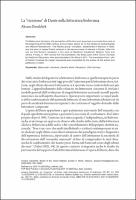Chapter La “ricezione” di Dante nella letteratura bielorussa
| dc.contributor.author | Danilchyk, Aksana | |
| dc.date.accessioned | 2023-05-01T13:41:49Z | |
| dc.date.available | 2023-05-01T13:41:49Z | |
| dc.date.issued | 2022 | |
| dc.identifier | ONIX_20230501_9791221500035_136 | |
| dc.identifier.issn | 2420-8361 | |
| dc.identifier.uri | https://library.oapen.org/handle/20.500.12657/62720 | |
| dc.language | Italian | |
| dc.relation.ispartofseries | Biblioteca di Studi di Filologia Moderna | |
| dc.subject.classification | thema EDItEUR::D Biography, Literature and Literary studies | en_US |
| dc.subject.other | Belarusian Literature | |
| dc.subject.other | Dante’s Work | |
| dc.subject.other | Reception | |
| dc.subject.other | 20th Century | |
| dc.title | Chapter La “ricezione” di Dante nella letteratura bielorussa | |
| dc.type | chapter | |
| oapen.abstract.otherlanguage | For Belarusian literature, the perception of Dante’s work assumes a concrete form only at the beginning of the 20th century and is linked, above all, to the names of Janka Kupala and Maksim Bahdanovič. The literary group “Uzvyšša”, established in Belarus in 1926, and the work of Jasep Pušča ushered in the second wave of interest in Dante. After the war we find Dante’s reception in the work of Uladzimir Karatkevič, Maksim Tank and others. Finally, in 1997 comes the first translation into Belarusian of the Divine Comedy by Uladzimir Skarynkin, who also translated Vita Nova in 2011. The translation from Latin of Dante’s treatise De vulgari eloquentia was completed by the author of this article and published in 2004. | |
| oapen.identifier.doi | 10.36253/979-12-2150-003-5.08 | |
| oapen.relation.isPublishedBy | bf65d21a-78e5-4ba2-983a-dbfa90962870 | |
| oapen.relation.isbn | 9791221500035 | |
| oapen.series.number | 70 | |
| oapen.pages | 23 | |
| oapen.place.publication | Florence |

